IELTS Band Score
On this page, you will learn about the IELTS band score system, the method used to calculate your overall exam mark.
The good news is that you can’t fail the IELTS exam. Results are graded from 1 - 9, with 1 being the lowest score you can get and 9 the highest.
Each component of the test – Writing, Speaking, Reading and Listening – is given an individual score, so your overall exam result will be made up of a score for each component and an overall band score. The overall band score is the average of the four individual scores.
For example:
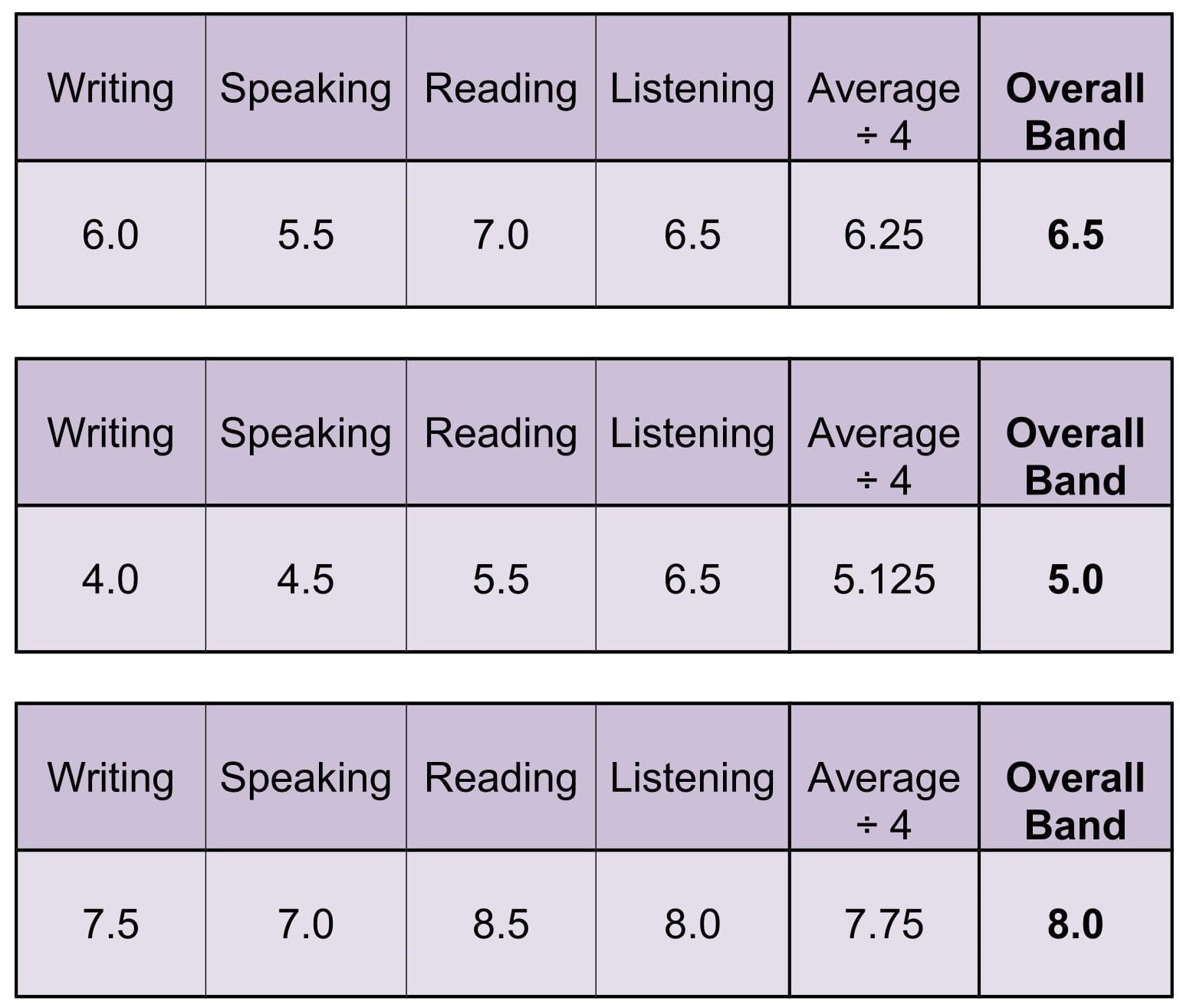
If the average of the four individual scores ends in .25, the overall IELTS score will be rounded up to the next half band.
If the average of the four individual scores ends in .75, the overall IELTS score will be rounded up to the next whole band.
For some people, both the individual scores and the overall band score are important. This will depend on the purpose for which you are taking the IELTS exam.
For example, a university will typically require an overall IELTS band score of 6.5 with no component less than 5.5.
If you are taking IELTS for a university application, be aware that requirements differ between universities and even between different courses at the same university. Always check what score is required.
For more information on IELTS score requirements and what happens if you don’t get the score you need, read this page: Your IELTS Score
The IELTS Band Score Scale
Your band score is designed to provide an accurate assessment of your level of proficiency in all four aspects of English – Writing, Speaking, Reading and Listening.
This can then be used by various institutions to help them decide if you will be able to study, work or live successfully in the country to which you are applying.
This table shows the overall IELTS scores and their descriptors.
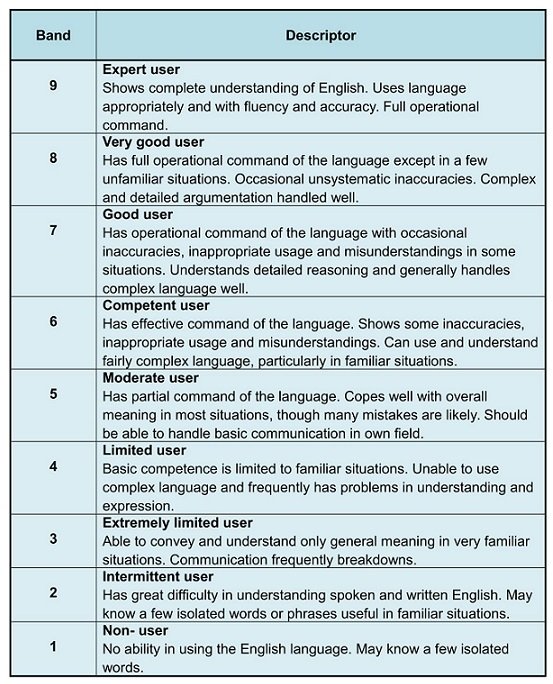
IELTS Scoring in Detail
Here is some information about how the individual components are scored which will help you to understand the IELTS band score system.
Listening
The listening test contains 40 questions. One mark is awarded for each correct answer (raw score). The score out of 40 is then converted to the IELTS nine-band scale.
Listening Test - Raw Score Conversion
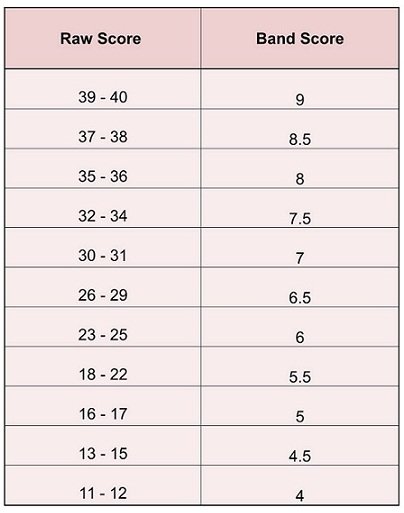
Reading
The reading test also contains 40 questions with one mark awarded for each correct answer (raw score). The score out of 40 is then converted to the IELTS nine-band scale.
There is, however, a difference in grading between the Academic and General Reading tests as can be seen in the tables below. They show the average number of marks required to achieve a particular IELTS band score, although this may vary slightly between exams due to the variation in texts used on different occasions.
Usually, it is necessary to answer a greater number of questions in a General Reading test correctly to gain a given band score than on the Academic Reading test.
The difference between the Academic and General Reading tests is one of genre or text type. The Academic Reading test is likely to contain texts with a greater complexity and which contain more difficult vocabulary.
For more information about these two different versions of the IELTS exam, and for help in deciding which one you should take, click this link: Which IELTS – Academic or General?
Academic Reading Test - Raw Score Conversion
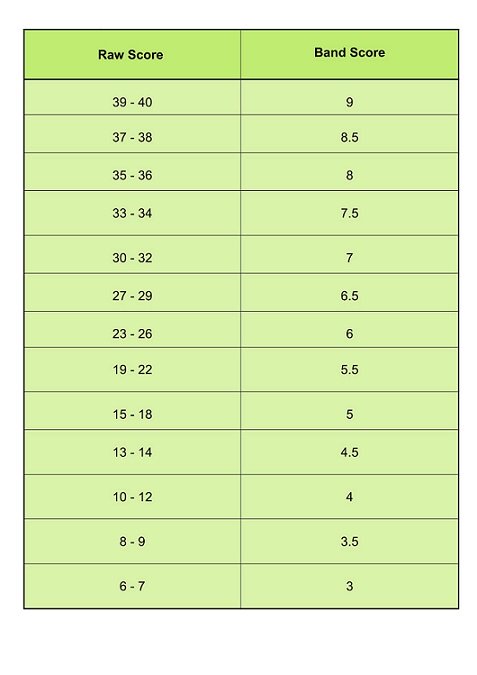
General Reading Test - Raw Score Conversion
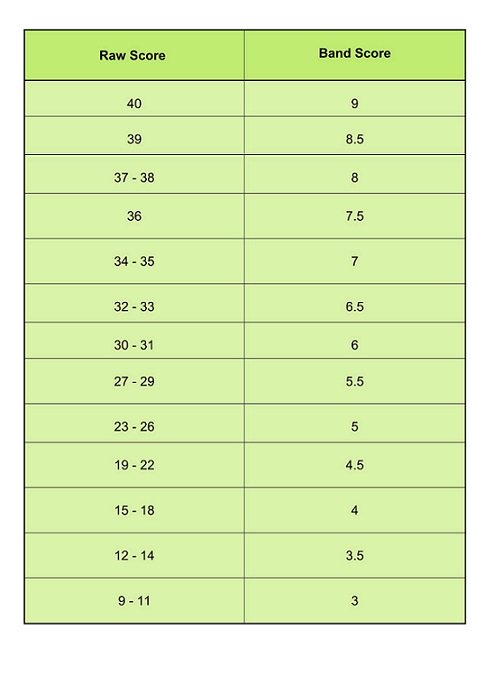
Writing
The two part writing test is marked by an examiner who awards an IELTS band score based on four criteria:
- Task Achievement (Task 1) / Task Response (Task 2)
- Coherence and Cohesion
- Lexical Resource
- Grammatical Range and Accuracy
Each criterion carries equal weight. An average is taken of the four criteria scores to give the overall IELTS band score.
Click these links for PDF downloads giving detailed descriptions of the criteria for each of the writing tasks.
Writing Task 1 – Assessment Criteria
Writing Task 2 – Assessment Criteria
Speaking
Similar criteria are applied to the speaking test and the IELTS band score is
calculated in the same way.
- Fluency and Coherence
- Lexical Resource
- Grammatical Range and Accuracy
- Pronunciation
Click this links for a PDF download giving detailed descriptions of the criteria for the speaking task.
Speaking Task – Assessment Criteria
You'll find lots more information about the IELTS exam on the pages listed below or go to the IELTS Exam hub page to locate specific questions and answers.
More Pages About The IELTS Exam:
Which IELTS - Academic or General?



